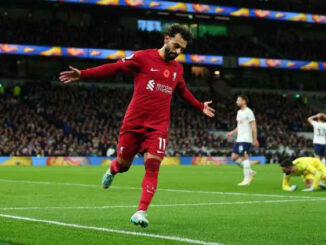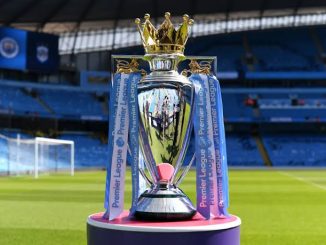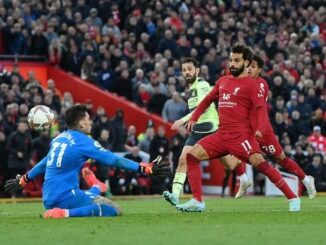
In a season that was notable for Jurgen Klopp announcing his departure from Liverpool because he was “running out of energy” to do the job, Pep Guardiola was able to push Manchester City on to the Premier League title once again.
That relentless drive remains, that appetite to coax yet more from a team that had already achieved it all in winning the treble. Victory in the FA Cup final will complete another double-back-to-back doubles for the first time in English football history.
Beating West Ham on the final day of the Premier League season makes City the first team to win English football’s league title four times in a row too. It is an accomplishment that Guardiola prizes, having appeared to use it to spur on himself and the group.
It needed something because Arsenal’s ambition was obvious. Having fallen short last season, Mikel Arteta’s Gunners pushed City all the way. Some thought that desire would be the difference, that City’s own levels were bound to drop after scaling the heights.
“My most difficult season for United was the season after winning the treble,” Gary Neville had told Sky Sports. “We did win the Premier League but the other teams were not very good that season. I had a nightmare. The previous season took so much out of me.
“What is City’s cause this year? They have achieved utopia. They cannot do any more. When you have fought so long and hard to win a Champions League like they have and won the treble, there has got to be that little bit of a sigh of relief.”
This was the backdrop to the campaign, the context of this triumph. City navigated that, nevertheless, overcoming the complications of the Club World Cup – won in Saudi Arabia in December for the first time in the club’s history – and the congestion that it caused.
“Could that have an effect?” wondered Jamie Carragher on Sky Sports. “You come back and can be a couple of games behind.” That seemed to be the case when City were fifth at Christmas, behind not just Arsenal but Liverpool, Aston Villa and Tottenham.

“There is a myth around City that they have a massive squad. They have never had a massive squad. They have 15 or 16 top-class players. If they had a bit of bad luck with injuries, one of the big players were out, how would they cope with that?”
It was a question that this City squad had to answer. Erling Haaland, last season’s player of the year having broken the Premier League’s single-season scoring, was out for 53 days either side of Christmas, missing 11 games. City won 10 and drew the other.
The departure of Ilkay Gundogan, so often the talisman and scorer of both goals in last season’s FA Cup final, put more onus on Kevin De Bruyne. So when the Belgian playmaker broke down on the opening weekend of the Premier League season, it felt significant.
De Bruyne had not gone more than a couple of games without starting throughout the whole of last season. This time around, he was absent from the starting line-up for 31 consecutive matches, a run that began in August and did not end until January.
By then, he had already made a difference off the bench in helping to turn the game around at Newcastle. That was an example of how City’s small squad stepped up when it mattered, Oscar Bobb producing the finish to win that one in the 91st minute of the match.
ALSO READ: Manchester City win Premier League for third successive season as Arsenal lose
It was one of many key moments in the campaign, culminating in perhaps the most dramatic of the lot. Stefan Ortega’s save from Heung-Min Son, having come on as a substitute, exemplified the ability of erstwhile fringe players to make decisive contributions.
Bobb was needed because Riyad Mahrez had gone, Cole Palmer too, just as he had seemed ready for a bigger role. John Stones endured a disrupted campaign. Jack Grealish may have been the most obvious example of a player who needed some time to go again, Sky Sport said.
Others grew. It feels jarring to call this a breakthrough year for Phil Foden given that he has made meaningful contributions to so many of City’s previous successes. But 27 goals in all competitions represents his best return. He became the team’s driving force.
Never more so than on the final day against West Ham. City supporters have become accustomed to success but also steel themselves for nervy finishes. Foden’s early goal ensured that City led the way for all but seventy-odd seconds of the game.
Rodri settled it with what has become a familiar intervention. The midfielder went through the campaign without losing a game in any competition – missing all four defeats. The control that he brings continues to set him apart from others in his position.
‘Let’s try again.'”
How long can Guardiola and City continue to do this? That remains to be seen. Perhaps it is only once he leaves, and if his team were to then suffer a surprising dip, that the scale of his accomplishment in sustaining success for so long would truly be understood.
Until then, all that his rivals can do is continue to push themselves to the limit, hoping against hope that Guardiola’s appetite will soon be sated. The sight of him celebrating his sixth Premier League title on Sunday suggests that time has not yet come.




